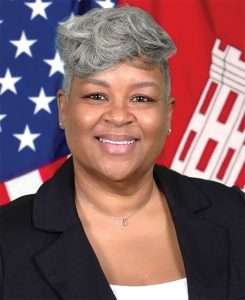Memphis District Operations Chief Honored With Achievement Award
With a 26-year Corps of Engineers career that has included serving as the Memphis Engineer District’s first female Operations Division chief, along with deployments to Afghanistan and Kuwait, Andrea Williams is rightfully proud of serving her country.
 That service is now also being recognized by others, as the Black Engineer of the Year Award (BEYA) STEM Conference recently selected Williams to receive its 2024 Career Achievement Award.
That service is now also being recognized by others, as the Black Engineer of the Year Award (BEYA) STEM Conference recently selected Williams to receive its 2024 Career Achievement Award.
The award recognizes significant achievements as an engineer for a U.S. government organization. Williams, 52, of Arlington, Tenn., was to receive it at the BEYA Awards Ceremony February 17 in Baltimore, Md.
In a letter announcing Williams’ selection for the award, Tyrone D. Taborn, CEO and Publisher of U.S. Black Engineering and Information Technology magazine, wrote, “Ms. Williams’ achievements in STEM stood out among the hundreds of nominations that were evaluated by the BEYA Selection Panel.”
As Operations Division chief, Williams has oversight of several district assets, including the Dredge Hurley, the mv. Mississippi, three pumping plants and several revetment units.
In total, she supervises about 250 employees.
While she takes that oversight seriously, “I never feel like I’m a supervisor,” she said. “I always feel like I try to work for them. If I give them what they need to do their jobs, everything flows very easily for me.”
Williams started her career in the Nashville District as a student intern while still in college at Tennessee State University.
She came to the Memphis District in 2000 as a civil engineer in the Construction Branch and was promoted to a supervisory civil engineer role in 2002 as Water Data Section chief. Then, in 2011, Williams advanced to the Operations Division at Ensley Engineer Yard to serve as the Plant Section chief, where she worked for eight years before joining the Galveston District as an operations project manager.
Shortly after her arrival in Galveston, Williams had the opportunity to work supporting U.S. efforts in Afghanistan. She served as chief of the Technical Services Branch for the TransAtlantic Expeditionary District, handling water, wastewater and power for Afghan National Police and Afghan National Army facilities throughout Afghanistan over the course of two years. During that time she was stationed first in Kandahar, Afghanistan, and then in Kuwait.
Following her time overseas, Williams returned to the Memphis district, temporarily serving as Operations Division chief for six months before being named as the permanent chief in April 2022.
Williams’ contributions to the Corps within the United States have also been significant. They have included directing a multi-agency national response to the 2022 Mississippi River low-water event and playing a central role in the 2011 Mississippi River flood recovery efforts.
She has also been involved in community outreach programs, including the Science, Technology, Engineering and Mathematics (STEM) initiative, regular career fair participation and volunteering for a Memphis City Schools program titled “Our Children, Our Future.” She has also helped to develop and conduct workshops to support pregnant teens in staying in school.
Williams graduated from Tennessee State University in 1994 with a bachelor’s degree in civil engineering and the Virginia Polytechnic Institute and State University with a master’s degree in civil engineering.
She said her first reaction to hearing she had received the award was being awestruck.
“The more I learn about the award, I’m even more humbled that somebody considered me for such a high honor,” she said
She wanted to thank her command, especially, Col. Brian Sawser, Lt. Col. Collin Jones and Maj. Sean Tedtaotao, along with Brig. Gen. Kimberly Peeples.
Additionally, she said, she had important mentors along the way, including David Berretta, who hired her in back in 2000 and John Monroe, chief of Geotechnical Engineering, who assisted her as she went through the Corps’ leadership development program. Both men have since retired.
Williams attributes many of her successes to a strong work ethic.
“Your work ethic has got to stand on its own,” she said. “I think that’s what’s guided me. I always sit down and think who is my customer, what do they want, and how can I give them the best product? I look to be as helpful as I can possibly be.”
In engineering, only 15 percent of those in the workforce are female, so Williams said she has sometimes found herself giving advice to younger women coming up in the industry. She advises them “not to hide their voice.”
“You have to make sure you’re heard,” she said. “Be that loud voice. No matter what they say, don’t let anyone push you down or hold you down. Don’t let anyone keep you from expressing your viewpoints because they are just as valuable as your male counterparts.”
Representation in the workforce matters, she said.
“Girls need to see other girls as engineers,” she said. “Black women need to see other Black women as engineers.”
Additionally, she said, it is important for others to see how they can have a satisfying career while also raising a family. Williams said the Corps gave her the opportunity to raise her son, Boyd, and daughter, Kristen. Williams also met her husband, Noah Sendyowa, to whom she has been married since August 2021, while deployed overseas with the Corps.
Williams is also a grandmother to 4-1/2-year-old Cairo and 1-year-old Alara.
She summed up her time with the Corps, saying, “I’ve had a wonderful career.”
Jessica Haas, public affairs specialist with the Memphis Engineer District, contributed to this report.



